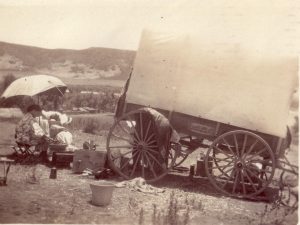Posts by Kim Bullock
Flickr Creative Commons: Bruce Krasting
Trashing a little book called The Bridges of Madison County was a popular sport in the English department when I was in graduate school. Professors and creative writing students alike could not find a single thing to praise about the plot, the writing, the characters, or even the setting. My school was located less than an hour away from those famed bridges and most Iowans I knew revered anything associated with their beloved home state, so this extreme loathing seemed strange.
As fifty million copies of this “pretentious fluff” (as one professor repeatedly called it) sold, the nastiness escalated.
I had picked up the novel the previous summer because it looked like an entertaining love story – something I was certain not to have time to read once I became both a grad student and a composition teacher. I got exactly what I paid for – three hours of entertainment. Would I read it again? Probably not. Had I enjoyed it the first time? Sure. Clearly there was something wrong with me. Maybe I didn’t recognize good writing. Maybe I wasn’t smart enough to make it in academia. I sunk lower into my seat each time “that book” was mentioned in class and kept my mouth shut, not wanting to announce my ignorance to the brilliant masses.
And then one day, while meeting with the most vocal of my professors, I happened to glance at the bookshelf in her office. Her name appeared on the spine of a book I’d never heard of, a book I later sought out and could only find tucked away on a forgotten shelf in a local bookstore. (This was in the pre-Amazon days.) I could not have named a single character or plot point a week after reading it.
Those students who bashed Waller the most violently were the same ones who had nothing good to say about anyone else’s work in critique sessions. They read their own work aloud with a smirk, laughed at their own jokes, and paused at key areas to make sure everyone listening had time to appreciate a clever turn of phrase. They ignored all feedback.
At twenty-two I lacked the courage to suggest that the bashing stemmed from jealousy or insecurity, but I certainly thought it. I also made up my mind not to fall victim to that poison. I still don’t bash. Not publicly. Not among other writer friends. Rarely even in my own mind.
Read MoreFlickr Creative Commons: in lovely memory
My older daughter is six months shy of being a legal adult. The approach of this milestone has been fraught with anxiety, so I anticipated a rough night before she embarked on a new semester at the local community college. She’s taking an extra class this time. She has a part-time job. She worries about keeping up with it all. What I did not expect was for her to lament that she saw nothing to look forward to in the years to come. Community college will only lead to a regular college, which she is lukewarm about attending. College will only lead to a job she hates.
“What’s the point in any of it?” she asked. “Every adult I know is miserable.”
The weight of her negativity made remaining in her presence physically uncomfortable for this empath, but I couldn’t allow that comment to slide unchallenged. True, her father comes home shell-shocked from work most nights, but he isn’t all adults.
When I balked that I’m not miserable, she bestowed that special expression teenagers reserve for parental observations that conflict with their worldview. “Well, you’re not happy.”
I hadn’t given much thought to the idea of happiness lately, having spent the last four years as an involuntary sponge, absorbing the stress of one family member after another. I’d wring myself out only to fall into another puddle. I self-medicated with almost daily mocha lattes I no longer tasted, let alone savored. On particularly stressful days, I’d add a muffin, too.
I now own fat clothes.
She was right. I wasn’t happy, but what she had not lived long enough to understand is that happiness isn’t something that simply happens. It must be chosen. Every day we get to choose.
She had thrown down a challenge to prove her wrong, to show her another way. This was a wake-up call.
I’m convinced that much of what we call “writer’s block” is a consequence of emotional overwhelm. We are wired to put ourselves into the shoes of others, to share and, let’s be honest, sometimes to exploit their struggles by weaving them into a story. Easy prey to the perils of empathy, we become ensnared in that cycle of absorb/wring out/absorb and forget to allow ourselves to dry off in the sun. We forget to take care of ourselves. We forget to do the things that help us recharge, to pursue joy. Under these circumstances, when we have nothing left to give, is it any wonder our work can suffer, or even stall?
Read MoreFlickr Creative Commons: Alan Cleaver
I had grand plans for my next historical manuscript. The idea was solid, the plot outlined, and an experimental first chapter written. I’ve read that chapter twice now. The voice is compelling, the writing a level or two above ‘crappy first draft’ and it is still a story I want to write.
Just not now.
Getting this story down will require me to willingly break my own heart on a daily basis for over a year; it’s already broken each time I pull up the day’s headlines or log into social media. The parallels between the manuscript’s era and today are clear. An argument could be made that now is exactly the time for such a novel, but this writer knows her own mind enough to understand that reality must be a shade or two brighter before she can mentally take that risk.
Had I not vacationed in Maine this past summer, I would never have considered opening a manuscript I wrote and promptly abandoned back in 2004. While driving on the familiar roads of my youth, I made a passing comment that this story, which was in some ways a ‘you have no further power over me’ letter to my old home town, would be much richer if I were writing it today.
I still would never have considered opening the document had Ruth, the cantankerous grandmother from the story, not invaded my dreams and (colorfully) reminded me that my perspective on the minefield of mother/teenage daughter relationships is now immediate, not speculative. Since this is a major theme of the book, I had best get cracking while I have captive beta readers who will roll their eyes if Mama gets something wrong.
I tried arguing with Ruth, a futile concept if there ever was one. I write historicals now, I said. It’s all women’s fiction, she countered. It’s bound to be dated, I said. She laughed. You’ve been in those mountains recently, Dimwit. Add some damn cell phones if it makes you feel better. Nothing else has changed.
She had a point, so I read. I read until 2:00 AM. Several times I had a grand idea about how I’d handle a plot point, only to find out the same thought had occurred to me fourteen years ago. I even cried once.
There were issues, of course.
Read MoreFlickr Creative Commons: jechstra
I left home at sixteen and spent the next two decades hemming and hawing when asked where I was from. Upon hearing I’d lived in nine different places before I was three, most people assumed my entire childhood was equally nomadic, a perception I rarely corrected.
In truth I had roots, reluctant ones, thrust deep into the unforgiving soil of the western mountains of Maine. I knew every ski trail on Sugarloaf, every snowmobile trail in Kingfield, and every swimming hole in the Carrabassett River. I encountered moose and bear and lived to tell about it. I lost a notch out of my ear to frostbite. I knew the sweet agony of plunging into Rangeley Lake a month after ice cleared and the exhilaration of galloping my horse across abandoned farm fields.
My childhood brimmed with freedom and imagination, but being “from away” meant that much of it was spent alone, communing with tree friends instead of human ones. Seven years of isolation at a formative time of life hardened me against a home that could never be Home. Maine became my soul’s purgatory, a place I endured until my sentence ended and the cage door creaked open enough for me to fly away.
Nearly thirty years later, my children teenagers, it saddened me that they had no concept of how I grew up. Maine was a place on a map, interchangeable with Nebraska, Kentucky, or any other place to which they hadn’t been. They had never picked wild blueberries, ate lobster, dipped their feet in a frigid mountain stream, or seen a moose.
“We have to go,” I told my husband. “They’ll never truly know me if we don’t.”
Little has changed in the world I left behind. Sugarloaf has more condos. A few shops in Kingfield went out of business, replaced by new ones. The school I attended from grades 3-8 has added a couple rooms and PE classes now include snowshoeing. The high school has a newish sign but, thanks to an accommodating secretary, my family toured a building completely frozen in time.
“All it took to get in is to say you went here,” my older daughter said, “and she’s not even following us around. People are so nice here.”
My old high school hasn’t changed.
I’d noticed this, too, but years of believing otherwise conditioned me to assume it was due to the importance of tourism to the area or that the internet had softened insular tendencies. Tourists never ventured into Mt. Abram High School, though. No one would claim to have attended there if they hadn’t. That I brought my family all the way from Texas and made a point to stop in proved I was trustworthy.
The towns hadn’t changed. The people hadn’t changed. My perception of myself and my place in that world had.
Read MoreFlickr Creative Commons: darkday
I ignored the signs for months, convinced the anxiety, crying jags, insomnia, and moments of rage were hormonal potholes on Perimenopause Lane.
In my defense, life has thrown a few curveballs since December. Before I could send out queries on my newly completed manuscript, I came down with the flu. On Christmas Eve. This illness transitioned into a violent asthmatic/allergic cough that remained until mid-March. I lost fifteen pounds (good) but only because I could barely eat or sleep (bad). During this time one of my daughters was diagnosed with an anxiety disorder. A few weeks later her best friend received a lymphoma diagnosis. An elderly aunt and special needs cousin moved to Dallas and their new home required a major face-lift. I threw myself into helping them, trying to ignore the lack of response to my initial queries. I later discovered those same queries, unwisely proofread and sent between coughing bouts, contained a glaring typo in the second paragraph.
The ‘I am a complete failure’ refrain began and spread its venom into all aspects of my life until I questioned every decision I’ve ever made. After decades of writing and little published work to show for it, I must be a talentless hack. My daughter would not struggle so much if I’d recognized earlier how crippling her condition had become. My marriage of twenty years would be richer if I’d encouraged my husband’s full involvement and support with the children rather than letting him play computer games while I juggled everything on my own. (To be fair, he involves himself when asked.)
The only glimmer of happiness came when my other daughter discovered that her crush not only liked her back, but that he embodied the word “gentleman” and came from a family who welcomed her into their fold with open arms. Being a romantic, empathic by nature, and teetering on the brink of depression, the temptation to vicariously experience her joy proved irresistible. This high doubled when I saw the adoring expression he perpetually wore in her presence, though over time this feeling was accompanied by a sharp pang of motherly protectiveness. (For him!)
Perhaps I sensed that it was only a matter of time before she’d bristle when teachers referred to her not by name but as the girlfriend of a popular kid, before she’d decide she was too young to be with a boy who claimed (quite earnestly) that he hoped she’d be both his first and last girlfriend. When that day came and she let him go, I struggled to praise her self-awareness and maturity.
It was at that moment I realized I was not okay.
I’m in a place where many creative types find themselves at some point. According to a large-scale Swedish study at the Karolinska Instituet, families with histories of bipolar disorder, schizophrenia, depression, anxiety syndrome, drug and alcohol abuse, ADHD, anorexia and suicide are more likely to include people in creative or scientific professions. The study concluded that writers in particular were common among sufferers of schizophrenia, depression, anxiety and substance abuse, and were almost fifty percent more likely to commit suicide than the general population.
Read MoreFlickr Creative Commons: Lars Von Wedel
The helicopters are out in force again. The whir of propellers has become so commonplace since the morning of October 7th that the sound has faded into the background, a white noise machine only heard when the power’s cut.
Today it’s two news helicopters, and they’ve hovered over a field a couple miles due west of my house from mid-morning until nightfall, a field I’ve driven by daily since 3-year-old Sherin Mathews disappeared. I pass by her neighborhood, an enclave of McMansions one subdivision northwest of where I live, each time I mail a letter or go to the grocery store. If I look south while crossing the railroad tracks I can see the tree beside which Sherin’s adoptive father apparently made her stand at 3AM as punishment for not drinking her milk. It stands maybe fifty feet from the track, clearly visible from a busy street, in an area coyotes often roam. People leave flowers and balloons and hold prayer vigils, though the police dogs have all but proved she was never there.
It doesn’t matter that the smiling little girl seen in the news reports isn’t white or that she was born in another country. It doesn’t matter that she has developmental issues or that she has a limited ability to speak. She’s the community’s daughter now and the air grows heavier with each passing day she isn’t found. Things like this don’t happen in this area of Dallas, at least not in the twenty years I’ve lived here.
We’re all holding our breath.
Sherin Mathews – still missing
When police reported one of the family’s three cars had been missing between 4 and 5 AM on the morning of Sherin’s disappearance, I gave up all hope she’d be found alive. “That proves it,” I said to my pre-teen daughter. “He killed her and removed the evidence.”
“You’re jumping to conclusions, Mama,” she said. “Isn’t it possible that he searched near the house, didn’t find her, and then took the car out to look?”
I’ve run the toddler-gauntlet twice and know that any three-year-old left alone outside at night would scream loud enough to wake the neighbors. Any father, upon finding his child gone, would at the very least wake his wife, who reportedly slept through the whole ordeal. He’d call the police and pound on neighbors’ doors, organizing a search party. He would not, as he claimed, do laundry and wait for her to turn back up. For five hours.
I bit my tongue, though, because my daughter asked a valid question. It WAS possible he had an innocent reason to leave the house, just as he had a plausible reason to attempt to give the girl milk in the middle of the night. (Her developmental issues required her to eat often.)
My daughter and I had both heard every publicly known detail of the father’s story. One of us was willing to suspend disbelief enough to objectively consider all possible motives. The other will not easily be convinced the man does not deserve to spend the rest of his life behind bars.
As a mother, I’m horrified by what has likely happened to this child.
As a writer, […]
Read MoreFlickr Creative Commons: Ruth Hartnup
I admit it. For years I hesitated to invite anyone into my home, cringing even when my parents crossed the threshold. If there is a way to keep a house clean while sharing it with a husband, two children, three dogs and a Maine Coon cat, I haven’t found it. Dust happens. Fur happens. Clutter happens.
My kitchen was the stuff of nightmares. The forty-year-old popcorn ceiling literally came apart at the seams, raining bits of plaster on me while I attempted to cook. My husband unsuccessfully tried to pry up the once-white kitchen sink years ago, leaving behind a buckled and rusty patch on the lip. The counters didn’t quite match the back-splash, which no longer matched the cabinets because the chipping paint had become dingy. “This summer,” I told my husband, “we will tame this eyesore.”
In our family, there is not actually a ‘we’ in household projects involving cosmetic improvement. If you want to build the largest computer network in the world, my husband is your guy. He can scatter neutrons and is a whiz at calculus. Coordinating colors, though? Evenly painting a cabinet door? Um…not so much.
Determined not to lose all writing momentum during the remodel, I promised myself I’d do that first each day. Write a scene in my manuscript and then I could scrape the ceiling! Finish the chapter and then I could paint the inside of the pantry! What did I do on day one? Facebook. What did I do on day two? Errands. Word count: 0. Work done on kitchen: 0.
It took me weeks of floundering to realize the flaw in my plan. You see, I didn’t really want to scrape that ceiling. In fact, cleaning a public restroom with a toothbrush sounded more appealing than standing high on a ladder under a deluge of falling plaster bits. No writing = no dust in my hair.
Nearly every writing advice book or column I’ve read emphasizes putting the writing first, but it turns out that this strategy doesn’t work for me and, in fact, may have been working against me for years.The next morning I forbid myself from opening my manuscript until the ceiling was down and the mess cleaned up. Work done on kitchen: Goal met within two hours. Word count: 1200. The next day I painted the ceiling and still wrote 700 words.
Psychologically this makes sense if you look at the situation as a five-year-old might. Pretend your writing is an ice cream sundae and a dreaded chore is a heaping bowl of lima beans.
Read MoreFlickr Creative Commons: Luis Ramirez
Several years ago I read The Underpainter, a novel by Jane Urquhart. The protagonist, Austin Fraser, creates a series of paintings depicting the people who have touched his life, then erases the details by applying progressively lighter shades of paint. Over the course of the novel, the paintings become a metaphor for how an emotionally crippled man has avoided true connection. Urquhart herself said in a June 2001 interview with January Magazine that she ‘hadn’t expected [Austin] was going to do what he had at the end’ and was so furious with him that she nearly couldn’t publish the book.
I was furious with him, too. The Underpainter remains the only novel I’ve ever thrown across the room in disgust. It took a full day for me to cool off enough to retrieve it and keep reading. As awful as Austin was, I still wanted to love him. Even as I write this, his rejection stings.
Shortly after I finished The Underpainter, I inherited a box filled with drafts of a memoir written by Madonna Ahrens, the protagonist of my own novel-in-progress. The manuscripts served as a series of portraits of her husband, landscape painter Carl Ahrens. The top, most recent version, was identical to the one she had self-published in 1945. It featured a Brontesque hero—tall, dark, brooding, and a trifle too perfect.
Earlier drafts made allusions to Carl’s temper, always followed by an anecdote illustrating his extreme gentleness. Yes, he could be cantankerous and difficult, she admitted, but illness and pain were the cause. Only a kind, compassionate man would revive a stunned honeybee or engineer an artificial leg for his rooster. The takeaway message, in modern terms: cut the guy some slack.
Tucked inside the earliest draft, on a loose, handwritten sheet, I discovered a truth that left me seething, one Madonna had taken great pains to conceal.
He was afraid of my youth, my [singing] voice, even my appearance, and wanted to make sure of keeping me all for himself by shutting out every aspect of my life which he could not entirely dominate. It was quite understandable. He had changed the whole course of his life because he loved me…As he gave his love freely and without compromise, entirely to me, he not only wished, but demanded, the same in return. He must be first, before the children, before music, before anything at all, and not only first but second and third as well.
It was not a happy moment to discover that the hero of my WIP was (at times) a controlling ass-hat, especially since I share DNA with said ass-hat. I did not want to know about, much less ‘excuse’ this aspect of his personality. An easy solution would have been to tuck that sheet away and feign ignorance.
A few things made me choose a different path:
It was quite […]
Read MoreKim’s great-grandmother doing the wash – San Diego 1906
With the popularity of shows like Who Do You Think You Are, Finding Your Roots and Genealogy Roadshow, compiling a family tree has transformed from a hobby for grandparents and history geeks to a mainstream pursuit. The shows illustrate that true connection happens when someone in the present gains insight about themselves by learning how traits, personalities, attitudes and even phobias have passed down through generations.
Names and dates are secondary. It’s the stories that move us.
I grew up with tales of an adventurous young artist who made a catastrophic attempt to fly off a barn roof, contracted a tubercular hip, became a cowboy in pioneer Montana, traveled with Calamity Jane and was adopted by an Ojibwa chief. My grandmother occasionally slipped and referred to him as ‘Daddy.’ Beaming with pride, she recounted each tale while we sat surrounded by paintings of trees that laughed, danced, grieved and embraced—tangible proof that her hero had once been a flesh and blood man. I saw echoes of his face when I looked in the mirror, from the set of my eyes to the bump on the bridge of my nose. I’ve long sensed myself being watched over, guided, and sometimes cajoled into writing my work-in-progress, a novelization of the scandalous relationship that led to Carl Ahrens’ downfall in the art world.
I was lucky enough to have my story handed to me. Yours may take some digging to unearth.
I Don’t Write Historical Fiction. Why Would I Look to the Past for Story Ideas?
Flickr Creative Commons: Silva Sala
“What if you couldn’t write?” my teen daughter recently asked me. “What if your hands refused to type and no doctor could explain why? What if voice recognition software didn’t exist and whenever you tried to have someone take dictation for you, your words came out in a jumble? What if your stories were forever stuck in your head? How would you feel?”
“Like I was in hell,” I said.
“This is dance class for me now.”
Ballet has been her whole world since she was nine. She had a barre in her bedroom. She hummed the major numbers from the Nutcracker starting in early September. She came home after a grueling six hours of class and rehearsal only to pirouette around the living room. She aimed for the next tier of her dance company five seconds after being promoted.
Senior Company by age fifteen. That was the plan.
Her body had other ideas.
Just before her fourteenth birthday, nagging knee pain worsened and made pointe work impossible. Thus started a year-long ordeal that included a knife-happy orthopedic surgeon, one unnecessary surgery, three physical therapists, cortisone shots, MRIs, a bone scan, blood tests, two awful misdiagnoses including one where she was told that ignoring the pain might result in the loss of her legs, a medical massage therapist, two chiropractors, a nutritionist, a psychologist, and a Pilates instructor.
Everyone had a theory for why she hurt. No one could fix her.
She remained determined to beat what ailed her. She wore ice packs on the way to the studio, always arriving an hour early to stretch before taking lower level classes to build up her strength.
Before her injury she never did modifications, never sat out, and never made a peep about pain. Now teachers began to guess which joint was the complainer du jour when she approached them. Before every combination, every jump, she had to consider the potential consequences. Pain waxed and waned, but never stayed away long enough for her to progress.
If pain drags on long enough, eventually we must question whether to press on or find a new dream.
My daughter’s body made the choice for her, but it took a year for her heart to accept she is not meant to be a dancer.
For better or worse, writers rarely face such a metaphorical fork in the road. Instead, our options branch out around us like spokes in a wheel. For example, if fifty agents reject a manuscript, we can:
This last option is the one I want to discuss today, because every writer I know has considered it at some point. Let’s face it, writing itself causes a certain amount of mental and emotional anguish, and the publishing world can make an American Ninja Warriors course look like child’s play. Most healthy and sane humans would not wish this upon themselves.
At what point, then, is it in your best interest to say “I’m done” and mean it?
Read MoreFlickr Creative Commons: Scott Smithson
I first saw Ontario’s Georgian Bay on September 28th, 2004, at 12:36 PM. I know this because my camcorder recorded my exclamation of “Oh, my God, look at that!” followed by gushing remarks about the water’s tropical hues, the gnarled windblown trees, and the islands scattered in the distance. I sounded like a teenage fan-girl whose crush/idol/future husband had just reached down from the stage to clasp her hand. While my brain floated in a sea of dopamine, my camera captured footage of my left shoe, a Tim Horton’s coffee cup, and the half-empty bag of Doritos on the car floor.
No, my family has not let me live this down.
Later that same day, while walking the beach at Leith, a Georgian Bay village featured in several chapters of my (now) work-in-progress, the breeze off Owen Sound ripped an awed gasp from my throat. No wonder the artist in my story had found inspiration there; reflections of him were everywhere. A gangly jack pine grew from a crack in a boulder, its trunk and branches bowed from brutal prevailing winds. Like the tree, my painter thrust his roots in forbidding soil, his body twisted but not broken by the gales of illness, pain and his peers’ malice. His changeable spirit resided in the water. One moment he might be manganese blue, tinted almost to transparency and mixed with a hint of yellow ochre at the shore. Dabs of indigo and rust shadowed distant banks; heaven only knew what shipwrecks lurked there. When his work went well, I imagined his soul was like the Sound’s channel, where viridian and Prussian blue waves danced, collided and merged into a turquoise vibrant enough to make my eyes ache. I swore they moved in time to Beethoven’s “Ode to Joy.”
What started as a genealogical research trip led not only to the discovery of my soul’s home, but also to my first glimpse of the world through my character’s eyes. Such insight could never have been achieved by looking at photographs.
Setting is an often neglected but crucial element in creating stories that resonate. Many authors write about familiar places; towns they grew up in, cities they currently live in. Doing this empowers them to paint an authentic picture with minimal effort.
Story does not always cooperate, though. If a novel is based on a real person, the writer is constrained by the time and place in which that person lived. A main character may refuse to speak with anything but a British accent. The climax of the story might fall flat if set anywhere but in Siena’s Plaza del Campo.
In that case, book a plane ticket or plan a road trip if at all possible. Here’s why:
Read MoreFlickr Creative Commons: Jay Walt
Back in late October, Liz Michalski wrote a post about how her portly manuscript lost an impressive 52,000 words. As someone who writes long and cuts later, I related well to her obsession with chopping adverbs, unnecessary adjectives, and dialogue tags. I ran that gauntlet myself when the last draft of my manuscript clocked in at 115,000 words.
The length wasn’t terrible, but I feared it might be beyond the comfort zone for many agents seeking debut historical fiction. I hoped to avoid unnecessary auto-rejects. This meant not only eliminating extra words but murdering entire scenes; a quick read-through failed to yield obvious victims.
Sure, there were a few tangents that didn’t propel the plot forward much, but those were the family stories that had so enthralled me as a child, the ones that inspired me to write the novel in the first place. I couldn’t possibly remove those! Besides, what reader wouldn’t laugh at the image of my male protagonist, as a teenager in the 1870s, streaking through a sea of picnicking Mennonites in an attempt to escape the town constable? The reason he was being chased, and in the nude no less, is a damn funny story. So is his failed attempt to fly, but I digress…
A few months prior to completing my manuscript, I attended Donald Maass’ 21st Century Fiction workshop. Throughout the talk, he peppered his audience with questions they might ask themselves while composing. The goal was to ensure that each scene both moved the story forward and contained enough tension to keep readers engaged. I wrote many questions down, intending to compile them for use in pre-plotting my next novel.
Faced with a fat manuscript and out of ideas, I revisited my workshop notes and had an epiphany. The questions, though originally posed to help writers craft compelling scenes, could be adapted to gauge if existing scenes worked in the context of the whole novel or should be banished to the morgue file. If the experiment proved all scenes to be essential, the book would have to remain longish. If not, I’d know where to cut.
I pared the (many) questions down to the most essential and dug in.
I won’t lie. The exercise was torture and took weeks, but it shined an incriminating spotlight on most of my ‘darlings’ as well as a few unexpected scenes. With proof that what I’d once considered essential served no literary purpose, I could hack away without remorse.
For those whose manuscripts must lose significant word count, here’s the process that saved my sanity:
Read More
We’ve all been there. That exhilarating time when brilliant ideas strike at stoplights and snatches of dialogue write themselves in our heads while picking up the kids from school or attempting (and failing) to fall asleep. Characters rebel and take on lives of their own, they haunt our dreams, and drive us mad in the best possible way.
And then life throws a sucker punch and all progress grinds to a halt. I suspect a lot of us have been there, too.
Here’s my story:
Back in April, while I powered through the last chapters of the-rewrite-that-tried-to-kill-me, my daughter started complaining about her knees. She’s in a ballet company and trains anywhere from ten to twenty hours a week, depending on the proximity to a production; aches and pains are inevitable. Since she still pirouetted around the house, I wasn’t concerned.
She had no “uh oh” moment, no swelling, no bruising, but the pain soon robbed her of the ability to dance en pointe, which for her is the equivalent of having every drop of joy wrung from her body and thrown out the window. I took her to an orthopedist. Her diagnosis: Plica Syndrome. No, I’d never heard of it either. Plica are extra membranes in the knee that many people have and with which most of those people peacefully coexist. In athletes who perform repetitive motions, such as plies, those membranes can become inflamed and make life miserable.
Her prescription: Take Meloxicam and ice the knees before and after every class.
After gritting her teeth through a performance in June, she took a week off to rest, and then another. She lamented that even walking hurt, that she felt like she was thirteen going on eighty. There were no more pirouettes around the house. No requests for help stretching her feet or her hamstrings. Her life was reduced to sitting on the couch and playing Minecraft with her sister. On our next visit, the orthopedist offered a surgical solution. Her need to dance overpowered her terror of having anyone go near her knees with scalpel or scope. He assured her that she could return to the studio as soon as she felt up to it without any restrictions.
Company auditions were in the fall and she dreamed of being promoted to the top tier and dancing Snow in the next Nutcracker.
He said that might still happen.
She said, “Take them out.”
Since plica aren’t visible on X-ray or an MRI, surgeons have no idea of what they’ll encounter until the scope is in. The bigger the plica, the more digging and cutting involved and the longer the recovery time. My child had the dubious honor of having “monstrous” plica.
She left the hospital on crutches and we both believed her life would soon return to normal. I set aside my laptop to become a full-time chauffeur, cheerleader, counselor, physical therapy coach and nurse. Bringer of ice for her knees and chocolate for her soul.
“My knees still hurt,” she said every day.
“Give it time,” I told her. The question of how much time lingered in the air between us.
Read MoreTherese here to introduce our newest regular contributor, Kim Bullock. If you’re a part of WU’s Facebook community, you’ll certainly be no stranger to Kim, who has long been a part of the Mod Squad there. Kim has also become a valued right hand for me here at Writer Unboxed, and as one of WU’s two Assistant Editors (along with Julia Munroe Martin) is a big part of the reason my sanity is mostly intact. When Kim’s longtime blog, What Women Write, was shuttered, it seemed the right time to see if she might like to bring some of her writerly wisdom to WU. Luckily for all of us, she accepted. Welcome, Kim!
Let me start with a confession.
It’s something I’ve told no one. Not my former blogging partners at What Women Write. Not my friends here at Writer Unboxed. Not my parents, my children, and certainly not my spouse.
Those who attended the WU UnConference with me last November would never have known I carried a secret shame, that there was a reason why the laptop I’d dutifully dragged with me from Dallas remained closed.
With the exception of blog posts, I had written nothing for half a year.
I started each day with the best of intentions. I’d open my manuscript to that same damn spot in the middle of page 242. After staring at my blinking cursor until I wanted to throw the laptop across the room, I’d scroll back to the beginning of the chapter and read it over. Every day I wondered why the person who had written that polished prose could no longer compose a sentence she’d let live.
The words flowed in my head while grocery shopping or stuck in traffic. I woke from dreams so vivid it took half the day to feel grounded in this century. I imagined my protagonist’s face superimposed over my own in the mirror. I saw my story as my hero saw his paintings; each brushstroke clear before ever setting brush to canvas.
The image vanished the moment my fingers touched the keyboard.
I might still be stuck on page 242 had I not attended Donald Maass’ 21st Century Fiction Workshop on the last day of the UnCon. One of the many questions he posed to us that day was this: What is your greatest fear?
I fear a lot of things. A tragedy involving my children, losing a parent or my spouse, tornadoes, doctors, having blood drawn, wasps, knives, night driving, large social situations, flying, pain, feeling shunned, failure and, of course, death. I nearly wrote down the latter because, let’s face it, that’s a biggie that will happen to everyone eventually.
Fear of death was not what made me set aside a story that literally pulses through my veins in favor of dust bunny eradication, though. There was another, more immediate, fear wreaking havoc on my psyche. One I happen to share with my protagonist. Go figure.
Read More- « Previous
- 1
- 2
- 3
- Next »






















